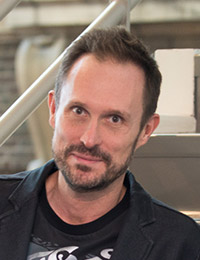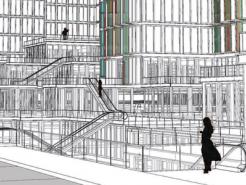
Steve Hardy
Associate Professor of ArchitectureBrief Vitae
M.Arch with Distinction, The Bartlett School, University College London, 1996
B.Arch with Distinction, University of Kansas, 1995
p-IET, Missouri State University, 1990
Steven was educated and has worked, both teaching and practicing, in the US and England.
Prior to UNL, he taught design at a number of universities including the Architectural Association School of Architecture, London Metropolitan University, UCL’s Bartlett School, the University of Westminster, and the University of Greenwich. He has held appointments as Assistant Director (UNL), Departmental co-Chair of Digital Design/IT/AV/CAD and Course Leader of the MA in Architecture & Digital Design (LondonMet) and served as Curator for the Environment, Ecology, and Sustainability Research Cluster (AA).
His background in practice includes, amongst others, BNIM in Kansas City, Missouri and Studio E Architects in London, England. Perhaps his most notable experience was as a member and director in Urban Future Organization, an international architectural practice and design research collaborative. His work with Urban Future Organization was widely published in 10x10 v.2 (selected by Zaha Hadid as one of the most interesting contemporary international young practices), World Architecture, Wallpaper, Archi’it, Achis, CA Contemporary Architecture, Domus, CasaBella, and Blueprint. Select successes include the winning competition entries for the Sarajevo National Concert Hall, Castelmola Art Museum, and the Mount Etna North Ski resort and invited exhibitions at the Venice and Beijing Biennales.
Teaching and Research Interests
Steven area of focus relates to building configurations, the forces that shape them (building codes, environmental differences, cultural norms, etc.), and the architectural affects embedded within each type of arrangement. Steven draws heavily on typological methods but transforms classification and analysis into the more ‘designerly’ (Nigel Cross) trait of patterning. He is interested in studying normative and unique configurations as well as the design and dissemination of hybrids and alternative prototypes. He currently teaches the ARCH262 Building Organization lecture, the ARCH565 Configurational Formations graduate seminar, and typically runs the ARCH 5/610-11 Projective Configurations Design Research Studios.
His current focus on configurational formations compliments his past research on environmental formations and parametric formations; he was the editorial author of the books Environmental Tectonics: Forming Climatic Change, AA Publications, 2008, and Parametricism: (SPC), ACADIA and University of Nebraska Lincoln College of Architecture, 2011. He has published papers on configurational issues including, ‘Urban/Suburban ReMix: Box.Store.Urbansim’, ‘Environmental Catalysts for Urban Prototypes’, and ‘The Impact of Explicit Logic on Re-Generating Urban Form’ at a variety of conferences including ACADIA, eCAADe, PUARL, IAPS, ACSA, and Future Cities. He is now working on discovery, research, and publications within the umbrella of his current focus, Building Configurations for Design.
Community Engaged Design Research
The Projective Configurations Design Research Studio (ProCon DRS) collaborates with community partners to research various building types. Collaborative studios provide an engaged learning experience for students and a pre-professional exploratory service for the community partner. Past studios have collaborated with Argent Group on both student housing in Lincoln and office space in Chicago, Lincoln’s Department of Planning and Economic Development on high density, low-rise housing for the South Haymarket Neighborhood Plan, City of Lincoln Libraries, and the Cities of Crete and Lincoln’s Fire & Rescue Departments. The ProCon DRS offers the following opportunities:
• Pre-Programming: helps a community partner better understand and frame the basic requirements of a project including site options, user wants and needs, preliminary areas, project data, etc.
• Background Research: assists the community partner with a robust study of a particular building type, including in-depth case studies, typical and unique patterns of arrangements, project parameters, relevant codes, and historical and potential future trajectories.
• Design Ideation: develops a range of preliminary design ideas and prototypes that aid the community partner in better understanding possibilities of a potential project.
For more information and examples of past projects, contact Professor Steven Hardy.
Box.Store.Urbanism
Box-store urbanism implies the re-location and re-conception of the large scale retail typically found in suburban bo
Follow the College of Architecture
